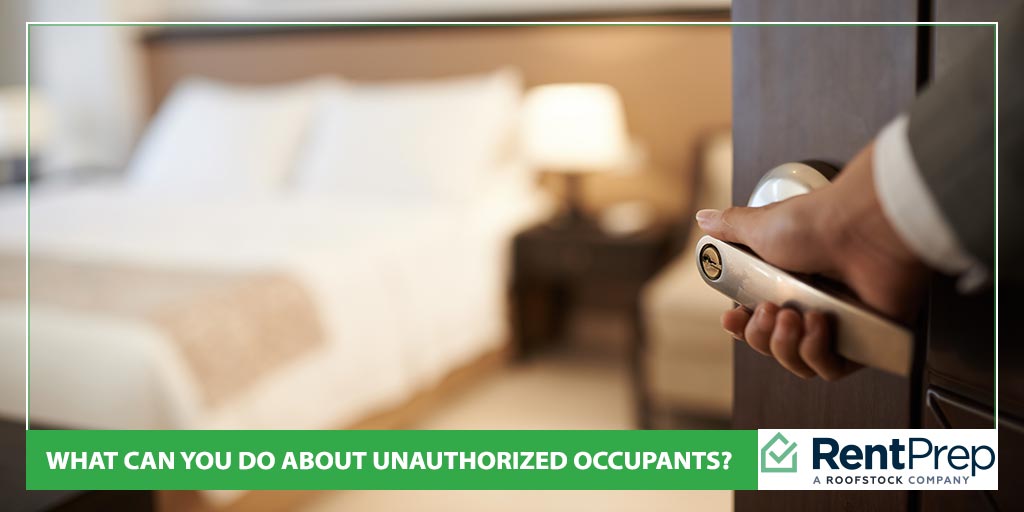
A lot of care goes into setting up each and every rental agreement. You work with the tenants to ensure they understand the expectations of the properties, and the tenants also have a chance to request specific inclusions or exclusions as well.
At the end of the rental agreement signing, you are all in legal agreement about how the property will be used.
Unfortunately, situations arise where there are unauthorized occupants in an apartment or property you manage. While they might not be causing problems right away, this could become a long-term issue. But what can you do about unauthorized occupants?
Figuring out how to deal with unauthorized occupants is a notorious problem for landlords, particularly in states where the laws are not as clear as they could be. Today, we’ll cover what the best way to proceed is should you find yourself in this situation.
A Table Of Contents For Unauthorized Occupants In Apartments
- What Is An Unauthorized Occupant?
- Why Are Unauthorized Occupants A Problem?
- How To Deal With Unauthorized Occupants?
- Note: State And Local Laws
- Make Things Clear
What Is An Unauthorized Occupant?
First, let’s start by defining what qualifies as an unauthorized occupant. Can a friend stay at your tenants’ apartment for one week without being called an occupant? When does a visitor become an occupant? These parameters are important to define.
An unauthorized occupant is any adult that is living in the property without being on the lease. This occupant is not a visitor any longer as they have moved their belongings in or are staying there for longer periods than is permissible by your lease terms.
Unauthorized occupants do not have any legal right to be at the property, and they also are not part of the legally binding lease agreement between you and your tenant. While they may have been allowed at the property as visitors, the long-term occupation turns them into unauthorized occupants.
Different states, localities, and lease agreements will define the allowable period for guests differently, but generally, there is a two week maximum on visitations.
Why Are Unauthorized Occupants A Problem?
If you haven’t dealt with a frustrating unauthorized occupant situation before, you might be wondering why it matters. If rent is paid on time, is it really your business who is living in the property?
There are a few reasons why you should take any and all unauthorized occupants seriously.
Potential Damages

Should the unauthorized occupant cause any damage to the property, it could be difficult to hold them accountable for their actions. While the tenant would ultimately be responsible for covering any damages caused by their “visitor,” this court case would be somewhat difficult.
If the occupant isn’t on the lease, however, you have no means of reprimanding them.
Lease Negligence
On the note of leases, it isn’t just the risk of damages that you will want to be concerned about. Unauthorized occupants have in no way seen or agreed to the terms of the lease. They are not legally bound to follow those rules even if your tenant asks them to.
The problems they cause could be something as simple as parking violations. Not a huge deal, but frustrating for your other tenants anyways.
Additionally, their presence may be breaking the lease altogether! Does your lease include a clause that prevents long-term visitors or subleases? If so, this unauthorized occupant is probably a lease violation.
Nonpayment Of Rent
If the tenant stops paying rent or even abandons the apartment, the unauthorized occupant may stay behind. Evicting this type of would-be tenant can be complicated, expensive, and time-consuming. By allowing an unauthorized tenant to stay at the property, you are setting yourself up for higher risk of ending up in this type of situation.
How To Deal With Unauthorized Occupants?
What can you do about unauthorized occupants when you realize that it is time to remove them from your property? You will want to take swift, decisive action to ensure that you can regain complete control of the situation.
Talk To The Tenant
The first thing that you will want to try to do is to talk to the tenant. Bring a copy of your lease agreement with you, and remind the tenant that they are not allowed to have any long-term guests without adding them to a lease addendum. Find out who the occupant is, how long they are staying, and other relevant information.
Sometimes, tenants will not realize that they are out of line. Alternatively, they’ll realize that you are not willing to look the other way. Ideally, this means that they will get the unauthorized occupant out of your property, and you can continue through the rental period with ease.
Evict The Tenant And Occupant
If your tenant is allowing an unauthorized occupant to stay at the property and your lease or local code specifically prohibits this, you can move to evict the tenant and the occupant.
The overall eviction process lines up to a standard eviction; the reason for eviction will be a lease violation. Here’s a quick overview of that process:
- Send a 3-day notice to fix or quit.
- If the tenant doesn’t follow through with a fix, visit your local courthouse and begin a filing for eviction. In some states, you can file to only evict the unauthorized tenant. In others, you’ll have the option to evict your tenant as well as the unauthorized occupant.
- The court will review the application and send out the required notices for all upcoming court dates.
- Prepare your defense, and defend your situation in court.
- The judge will determine what happens from there!
Before you do this, however, you need to be absolutely certain that your tenant’s actions violate your lease agreement. Evicting unauthorized tenants is one of the most difficult cases to win because tenants are allowed to have guests, so you will want to be sure about your case.
Clarify Your Lease For Future Protection

In order to avoid having to deal with this situation again in the future, it’s always a good idea to include very clear information about who qualifies as a guest, when guests are allowed, how unauthorized occupants will be dealt with, and any other questions that may come up in this vein.
Before you sign your next lease agreement, be sure that you have all of this inline with the template that you are using.
Note: State And Local Laws
As always, there are local and state laws that you need to pay attention to when dealing with this type of situation.
Virginia landlord tenant law on unauthorized occupants, for example, does not specifically allow tenants to have long-term guests, but it also does not specifically forbid them from doing so. Under this type of law, a tenant might try to argue that their guest is welcome.
When you are dealing with unauthorized occupants in your area, make sure that you check into your state and local laws to be sure that you are not going to be breaking any rules or guidelines.
Make Things Clear
The key thing to remember through the entire process of dealing with unauthorized tenants is that you need to make the rules clear with the tenant in the lease. If you do not, it is unlikely that your case will stand up to a court eviction hearing.
As long as the rules are clear from the beginning, you’ll have a good chance of being able to ensure that all tenants are acknowledged as such in the eyes of the law.

